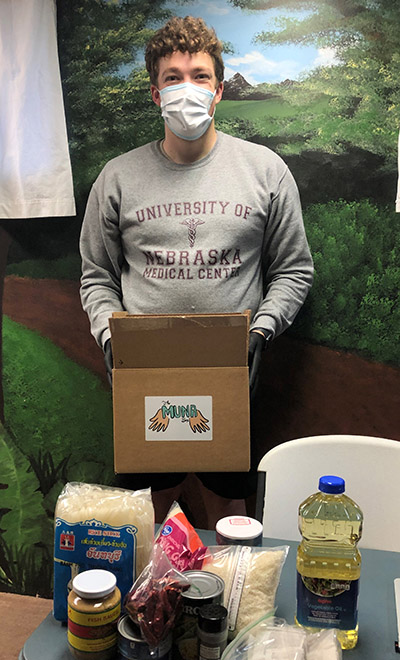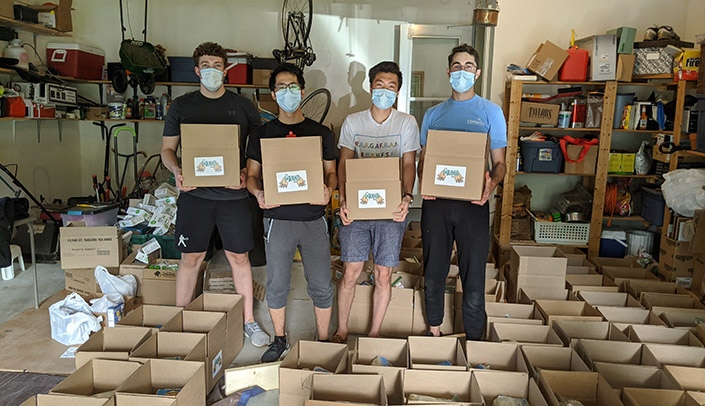Seif Nasir, a third-year medical student and the son of Palestinian refugees, has worked with refugee communities in the past.
So when Nasir, who earned a master’s of public health at Washington University in St. Louis, was brainstorming a community service project (part of the College of Medicine’s Impact of Infectious Diseases course), he wondered what the refugee communities in Nebraska might need as they grapple with the COVID-19 pandemic.
 |
Medical student Paul Witt holds a MUNA Box in front of a display of some of the food staples provided by the effort. |
“Here in Omaha, as one of the major refugee resettlement cities in the U.S., we have this population of people that are often marginalized or not specifically targeted and have needs that are neglected by a lot of interventions,” he said.
The result is the MUNA Box Project — a group of medical students providing food and toiletry staples, as well as information on COVID-19 safety measures, to refugee communities in Omaha and Lincoln by distributing boxes of donated goods.
MUNA stands for “Medical Students United With Neighbors Across America,” but Nasir, who is Palestinian-American, noted that, in Arabic, the word “muna” means pantry, adding a second layer of meaning to the name.
The group works to include culturally appropriate food items, Nasir said.
“In Omaha, where we’ve worked with Burmese refugees, we’ve been able to provide them with culturally appropriate boxes that include things like rice noodles, fish paste, bamboo shoots — rather than peanut butter or things we eat here,” he said.
The group also is working with translators to share COVID-19 information. Nasir’s mother, Arwa Nasir, M.D., division chief of general pediatrics and associate professor in the UNMC Department of Pediatrics, has produced an easy-to-understand pamphlet about COVID-19 in Arabic, and the MUNA Box Project is working to get the pamphlet translated into other languages, as well.
“There is a dearth of information regarding COVID-19 in easy-to-understand, straightforward English, and definitely in foreign languages,” Nasir said. “We can circulate this document and also use it as a framework to translate into different languages, such as Spanish, Korean, Vietnamese, Nepali and others.”
For distribution of the boxes, the group reaches out to community leaders or refugee organizations to pinpoint areas of need. It has teamed with Embrace the Nations, an organization that works with Burmese refugees, which helped set up and publicize a distribution event at a local community center.
“We’ll show up at a pre-designated location, set up and publicized by community leaders, and we distribute the boxes and, with the help of translators, collect basic information from them about their needs,” Nasir said. “Because it’s great to be able to provide things and connect with the community, but it’s also important when you’re doing any kind of community intervention to do a needs assessment with that community.”
Nasir said it’s exciting to see how willing the communities are to get engaged and share their language and culture with the medical students staffing the project. To date, the group is working mainly in Omaha and Lincoln, but Nasir and his classmates are trying to establish connections with Native Americans, such as the Omaha and Winnebago tribes, whose members may struggle with food insecurity issues.
“It’s been a difficult project at times, but it’s also inspiring to see how the UNMC community — and the community at large — embraces the mission to help these refugee communities,” he said.
